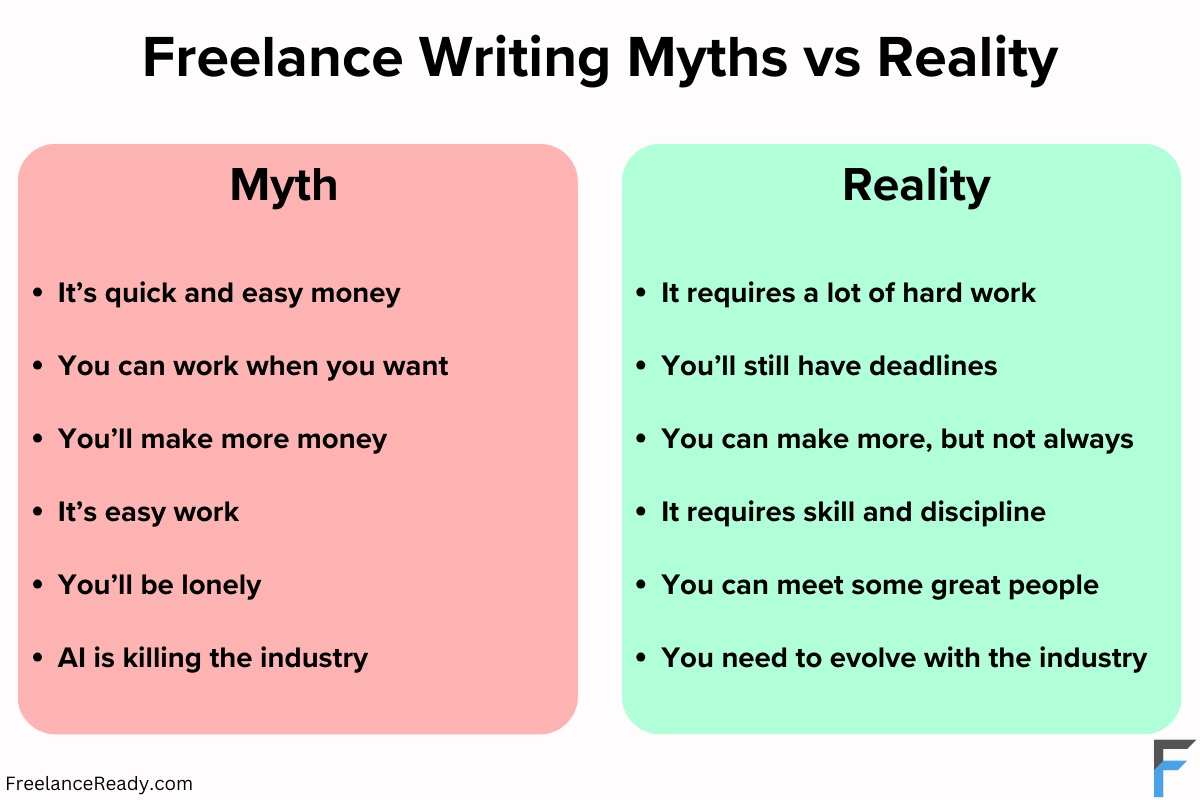When you first start freelance writing, you likely have some preconceptions and have heard lots of stories from others in the space. Unfortunately, there are a lot of freelance writing myths out there that you should be aware of before you get started.
Below, I’ll go through some of the most important myths in more detail, explaining why they’re just not fully true. I’ll then give you a few more tips for getting your freelance writing career off the ground!
1. Freelance Writing Is A Quick And Easy Way To Make Money
This freelance writing myth arises from the misconception that freelance writing requires minimal effort and can provide instant financial rewards. However, freelance writing, like any profession, demands hard work, dedication, and consistent effort if you want to be successful.
It took me about 3 months to make consistent income from freelance writing. This was on Fiverr, and I was at uni at the time and working a part-time job. So it wasn’t my only income source. As with everything, it depends how much time and effort you put in, but it’s definitely not going to be an overnight thing.
It takes time to build a client base, develop your skills, and establish a reputation that leads to higher-paying opportunities. Freelancers (of all kinds, not just writers) need to consistently market themselves, refine their craft, and navigate the competitive landscape to achieve financial success.
Falling into the trap of expecting quick and easy money can lead to disappointment and frustration. Recognize that freelance writing requires persistence, resilience, and a long-term approach to building a sustainable income early on, and you’ll be more likely to succeed in the industry.
2. Freelance Writers Can Work When They Want
While freelance writing does offer more flexibility compared to traditional employment, it’s important to recognize that, as a freelancer, you’ll still need to meet deadlines and fulfil your clients’ expectations.
You’ll often need to juggle multiple projects, handle administrative tasks, and manage your own business affairs. Effective time management and organizational skills are therefore essential to maintain a healthy work-life balance and meet client obligations.
Falling into the trap of thinking you can work whenever you want without discipline and structure can lead to missed deadlines, dissatisfied clients, and a negative impact on your reputation. You need to establish a routine, set boundaries, and prioritize your tasks to ensure you can effectively manage your workload and maintain a high quality of work for your clients.
If you don’t manage these aspects well, your freelancing career will be short-lived!
3. You Will Make More Money Than A Normal Job
While freelance writers can find high-paying clients, it’s unrealistic to expect a constant flow of such clients, especially in the beginning if your freelancing career. As I mentioned above, it took me months to replace even a part-time income. For my first few months, I was making the equivalent of $2 per hour at times! Not what I’d call a lucrative salary.
Building a client base and securing big-money projects takes time and effort. You need to consistently market your services, build relationships, and prove your value to clients.
It’s crucial to diversify your income streams, set realistic expectations, and adapt to fluctuations in demand and market conditions. Falling into the trap of assuming high-paying clients will always be readily available can lead to complacency and financial instability (I’ve fallen for this myself in the past, and it can be a rude awakening when the floor falls away from beneath your feet!).
Instead, focus on delivering quality work, expanding your network, and continually seeking new opportunities to grow your client base and increase your earning potential. It’s 100% a marathon, not a sprint.
4. You Can Just Reword Other People’s Content And Succeed
Plagiarism is never acceptable in freelance writing or any other form of professional writing. Clients expect original content that adds value to their brand or objectives. Plagiarism can damage your reputation, lead to legal issues, and harm the client’s brand.
Falling into the trap of thinking you can plagiarize or ‘spin’ other people’s content without consequences is not just unethical, but also detrimental to your long-term success as a freelance writer. Invest time and effort in creating unique and valuable content that showcases your skills and professionalism.
Your clients won’t want someone else’s content with your own spin on it, especially in an age where AI can do that for free in a lot of cases. You need to be able to provide additional value or clients will simply look elsewhere.
Plus, it’s no fun! There’s a lot of satisfaction to be found in crafting something great that’s also truly original.
5. Freelance Writing Is A Lonely Profession
While freelance writers often work independently, there are still plenty of opportunities for collaboration and networking. After all, you’ll need to network if you want any clients!
Joining professional writing organizations, participating in writing communities, attending conferences, and going to networking events can help freelancers connect with peers, gain new insights, and find collaborative opportunities.
Note: You don’t need to be traveling to conferences to meet people in the freelancing world. A lot (if not all) of your interactions will happen online, but you can still form some strong bonds this way!
Collaboration and networking can broaden your professional horizons, open doors to joint projects, and enhance your reputation. Isolating yourself and neglecting networking opportunities can limit your growth and exposure to new clients and possibilities as a freelance writer.
In other words, freelance writing definitely can be lonely. But it doesn’t need to be!
6. Freelance Writing Is A Dying Industry
Contrary to this myth, freelance writing is a thriving industry with immense potential. The demand for high-quality, human-written content continues to grow across various platforms, including websites, blogs, social media, and digital marketing.
As long as businesses and individuals require engaging and persuasive content, freelance writers will remain in demand. Adapting to technological advancements, staying versatile, and continuously improving your skills can ensure you have a bright future in freelance writing.
Believing the industry is dying can lead to missed opportunities and a negative mindset. While artificial intelligence tools may be making it easier for people to create content, there is still a big need for the value that only humans can provide.
I think we’ve all seen examples of some great AI-generated content that has somewhat scared us. But I’ve seen plenty more terrible examples that make me confident there will always be a need for quality freelance writers.
You can read more about what I think about this in my article on the future of freelance writing.

Other Things To Be Aware Of As A Beginner Freelance Writer
Set Realistic Expectations
As a beginner freelance writer, it’s essential to set realistic expectations for your career. Understand that success doesn’t come overnight, and that building a thriving freelance writing business takes time and effort. Be prepared to start with lower-paying gigs (like I did on Fiverr, although maybe not at $2 per hour!) to gain experience and build your portfolio.
Gradually, as you gain expertise and build a solid reputation, you can command higher rates and attract better clients. Patience and perseverance are key qualities for navigating the initial stages of freelance writing.
Develop Effective Communication Skills
Communication plays a vital role in freelance writing (and freelancing in general). It’s important to establish clear and open lines of communication with clients to understand their requirements, address any concerns, and maintain professionalism throughout your working relationship.
Responding to their messages quickly, listening to what they have to say, and being clear in your written and verbal communication are crucial if you want to keep your clients happy and coming back for more.
Manage Your Finances & Contracts
Freelance writing involves managing your finances and handling contracts effectively, typically all on your own. Keep track of your income and expenses and set aside funds for taxes and business-related expenses.
It’s also important to have a clear contract or agreement in place with each client, outlining the scope of work, payment terms, deadlines, and any other relevant details. Familiarize yourself with the basics of freelance writing contracts, and if necessary, seek legal advice to ensure you’re protected and fairly compensated for your work.
You can learn more about this in my guide to freelance contracts.
Never Stop Learning
Freelance writing is an ever-evolving field. So it’s crucial to embrace continuous learning that never stops. Stay updated with industry trends, writing techniques, and new tools or technologies that can enhance your work. Invest in resources like freelance writing books, online courses (there are lots of free ones out there too), and writing workshops to expand your knowledge and skill set.
Engage in self-reflection and seek constructive feedback from clients to identify areas for improvement. By continuously learning and evolving as a writer, you’ll position yourself as a valuable asset to clients and stay competitive in the freelance writing market!
Don’t Fall For These Freelance Writing Myths!
There’s no doubt that being a beginner freelance writer can be challenging.
But with dedication, perseverance, and a commitment to continually improving your skills, you can lay a strong foundation for a successful freelance writing career. Just be wary of the freelance writing myths I’ve discussed above! I’ve also already discussed other more general freelancing myths, which largely apply to writers too.
Freelance Ready is reader-supported. That means some links on this website are affiliate links. If you sign up or make a purchase through these links, we may earn a commission.

